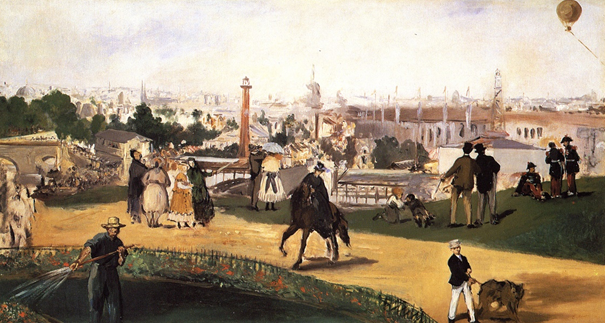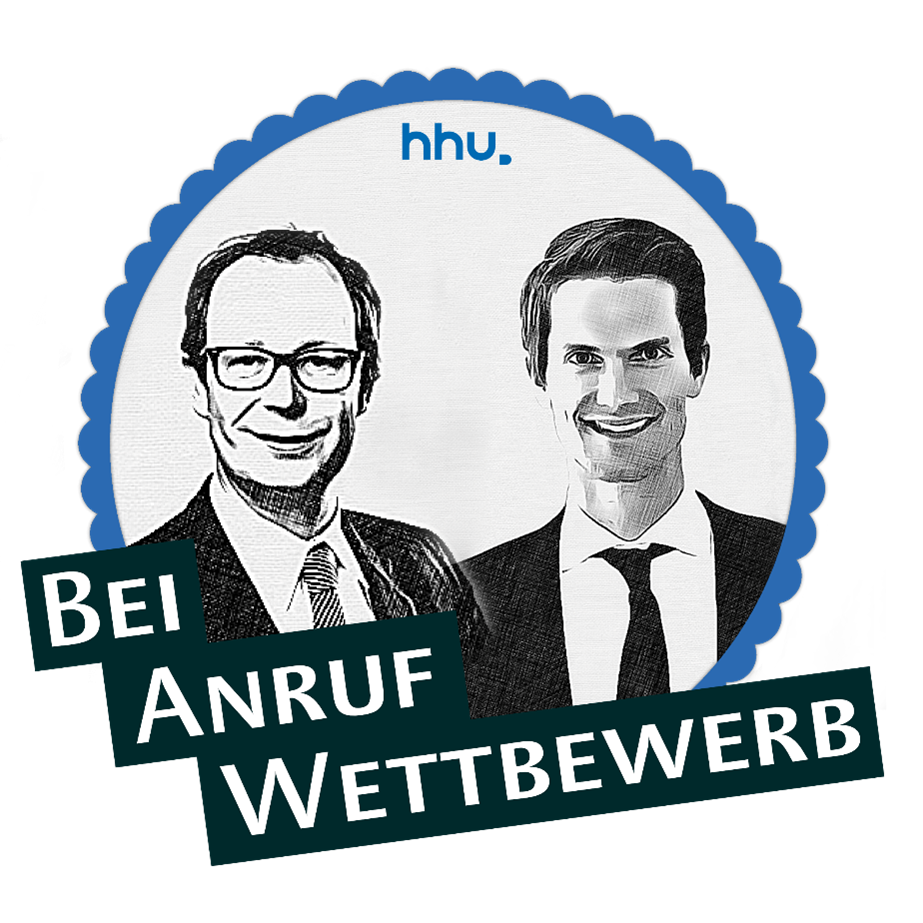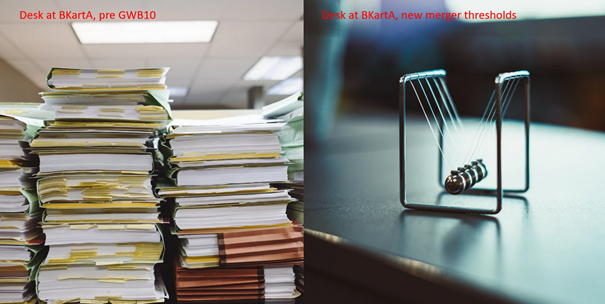
SSNIPpets (43): Tektonik
While marveling in the provisions of the new German competition act, indulging in a new podcast and anticipating feverishly (not literally) the solution of the vaccination problems, Rupprecht Podszun found a bit of time. And wrote the SSNIPpets – small but significant news, information and pleasantries – our pet project!
Romantic competition
Recently, the 130th anniversary of Nicolaus Otto’s death was commemorated, at least in the WDR radio programme ZeitZeichen, which has been running since 1972 (!). Otto, who invented the engine that was later named after him – at least in German “Otto-Motor”, founded a start-up with his colleague Eugen Langen (although the term start-up may not have been their language back in the 1850s.) Langen, in turn, has gone down in history as the father of the Wuppertal Schwebebahn (suspension railway).
When Otto and Langen realised that the motor engine could work, they founded the Gasmotoren-Fabrik Deutz AG. The necessary capital was injected by sugar czars Emil and Valentin Pfeifer of Pfeifer & Langen (fined actors in the refined sugar cartel). Wilhelm Maybach and Gottlieb Daimler were employed at Deutz. Daimler fell out with Otto and opened an experimental workshop (today: Lab) with Maybach in a garden house in Cannstatt. The rest is history on four wheels, as they say, and perhaps the internal combustion engine will soon be history too.
Why am I bringing up Nicolas Otto’s story here? No, no, not because I want to talk about the trucks cartel (Daimler…). But because I found the story so touching, how Nicolaus Otto got the engine running in the market: He was in competition with a French competitor, Étienne Lénoir. At the Exposition Universelle in Paris, Paris of all places!, Otto was able to assert himself in 1867: He won the gold medal there with his engine. (Another groundbreaking invention presented there was the hydraulic lift). Gold! That was how success was made in those days. At the Expo. In Paris. In fair competition.

And he so deserved – and needed it: Otto finally had enough capital to marry his ten-year-fiancée Anna Gossi, whom he had met at the Cologne carnival in 1858. Gossi kept her fingers crossed for his performance in Paris, and her love letters to Nicolaus, wishing him well for the competition (and for her marriage) are heart-warming. In 1868 they were married in St. Maternus church, Rodenkirchen. Seven children.
Cartel meeting in Brussels?
Back then, competition still had something romantic about it. Today, as we all know, competition is the icy wind blown through into our faces by the fury of capitalism. Isn’t competition showing its merciless cold again in the vaccine distribution wars?
Today, German and French suppliers no longer compete at world exhibitions for the best engine, but with politicians for orders for the most effective vaccine. However, the demand side is currently under more pressure than the supply side. The demand side would very gladly pay “whatever it takes”, if that could cure the stinginess from last summer.
But there seems to be a kind of small world exhibition on Sunday as well. Florian Eder of Politico’s Playbook writes in his newsletter about a remarkable summit:
“On Sunday afternoon, European Commission President Ursula von der Leyen will meet via videoconference the CEOs of all the vaccine manufacturers with which Brussels has signed advance purchase agreements, according to a list of confirmed participants Playbook has seen. Among them will be Sanofi’s Paul Hudson, Moderna’s Stéphane Bancel and Franz-Werner Haas of Curevac. The BioNTech/Pfizer duo is represented by both CEOs, Uğur Şahin and Albert Bourla.”
Eder does not say whether Margrethe Vestager as Competition Commissioner or at least her Head of Unit Antitrust Pharma and Health Services, Rainer Becker, will also be present. That would seem appropriate. After all, Adam Smith said:
“People of the same trade seldom meet together, even for merriment and diversion, but the conversation ends in a conspiracy against the public, or in some contrivance to raise prices.”
Excuse me for resorting to this well-known firecracker, but it sums up the situation too well. So now the people of the same trade meet in a conspiracy for the public.
Should there be an antitrust investigation in the wake of the video meeting, whether for collusion or exploitative abuse, there is one consolation: According to CIF case law (para. 57), it can be taken into account in setting fines that the competition law infringement was facilitated or favoured by state actors.
Redacted

The contract that the EU Commission has concluded with Astra Zeneca has been published today. With redactions, of course. Nevertheless, it’s nice, and can be filed under A for Advance Purchase Agreement in the pharmaceutical contract handbook. (Whether it is a successful example or not is in the eye of the beholder.) In section 11.1 it says about the intellectual property issues:
“The Commission acknowledges and agrees that as between the parties, (i) AstraZeneca shall be the sole owner of all intellectual property rights generated during the development, manufacture, and supply of the Vaccine, including all Know-How (collectively, the “Vaccine IP Rights”), and (ii) AstraZeneca shall be entitled to exclusively exploit any such Vaccine IP Rights.”
The preceding and following sentences are not readable. Pity.
Incidentally, the contract is concluded according to Belgian law. If the worst comes to the worst, the courts in Brussels will decide on disputes between the parties.
Incidentally, Der Spiegel has just reported that the redactions in the document can apparently be reversed quite easily in that PDF. Take a look at the last cartel decisions and see how carefully Brussels blacked them out. Brussels does not seem to have the luckiest hand in this whole vaccination thing. Spiegel has not yet disclosed the contents of the passage that is of interest here.
Video conferencing fun
Speaking of video conferences in Brussels: Margrethe Vestager spoke with Sundar Pichai, the head of Google. There’s plenty to talk about, from the Digital Markets Act to the Google cases pending before the courts to the latest investigations in the online advertising market. At first I thought: Oh, wow, I would have loved to have been a fly on the wall during that conversation! But then such conversations are probably quite boring. Lewis Crofts from MLex writes on Twitter:
“Executive Vice President Vestager and Google CEO Pichai have discussed issues within the digital and competition portfolios.”
Whether it is a quotation of an official statement or Croftsian irony – I can’t tell.
However, Vestager has a busy schedule in January anyway; according to her calendar, she has held talks with ministers Bruno Le Maire and Olaf Scholz, with German TV director Thomas Bellut, with Andreas Scheuer (who was still the German Minister of Transport at the time of writing this post, but this can change any minute), with Robert Swaak (CEO of ABN AMRO) or the former DG COMP employee Nadia Calviño, who is now Spanish Minister of Economy. And that is only a small sample of Vestager’s programme. There are supposed to be politicians who play Candy Crush at video meetings as has been revealed by a leading German politician on Clubhouse this week (to the dismay of many since the meetings he referred to dealt with Corona). My guess is that Vestager, in her tried and tested manner, is more likely to reach for the knitting.
Advertising (1)
A word about Google: I find it interesting that in the whole digital discussion, it is slowly getting to where it really hurts. The focus is increasingly shifting to the fact that Google and Facebook are essentially gigantic advertising machines and generate significant revenues with hardly anything else. The closer competition policy gets to this issue, the hotter it gets.
The current developments in Australia show how high temperatures may actually climb: There, Google has threatened to shut down if licence fees are due for journalistic content. The reports of the British and Australian competition authorities on the advertising markets should be studied carefully. (Don’t worry, one only came out yesterday, you haven’t piled up a reading debt yet. The other has been around for a while and is described as “the bible” by Simonetta Vezzoso, who tirelessly manages to keep track of all the reports on digital antitrust.)
Advertising (2)
Talking about advertising! I simply have to make product recommendations now. And no, I don’t earn any money with it (I wish!).

First: Justus Haucap, the competition economist at Heinrich Heine University, and I have a podcast! And of course we are as proud as a law firm lawyer who finally pulls into the underground car park in his Tesla! Our podcast is called Bei Anruf Wettbewerb (roughly: When competition calls), is available on popular podcast formats (e.g. Spotify or Overcast), and we have a really great intro (spoken by Jens Jensen, a trained radio announcer) and a really great outro. The part in between – we work on that from episode to episode. So if you want to be there from hour 1 to see how a podcast like this is in the making, you should subscribe or at least listen to it. You can find the podcast here, for example. The first episode is about Section 19a GWB, what else, but episode 2 is already coming up next week. It is in German, but it’s never too late to practice! Marc Feist, Clemens Pfeifer and Nils Pelster are the people without whom the two professors wouldn’t even have managed episode 1. (Episode 0, let it be revealed here, has been discarded, by the way).
Secondly, Ascola is the Academic Society for Competition Law, and some readers will be members. Once a year we meet, even virtually, like last time when Margrethe Vestager, Steven Salop and Dan Rubinfeld also dropped by. This year we’ll see each other either in Porto or via Zoom. Now for the good news: the deadline for submitting proposals in response to the Call for Papers has been extended to 8 February 2021. Go!
The fresh website of Ascola and the call for papers can be found here. By the way: This is an exclusive club. Only scientists have access.
New law
Have you noticed? We haven’t even talked about the 10th amendment of the German competition act yet. Philipp Bongartz had already reported here on the last-minute changes. I find it almost a little bit astonishing how little attention these groundbreaking changes to antitrust law are now attracting, hardly that they are in force. Maybe that’s the hangover, or maybe it just seems that way to me because the antitrust politicians have long since moved on to the battleground of European platform regulation.
Daniel Fülling and Annett Arlt from the Federal Ministry of Economics and Technology recently presented the new law to our young researchers in Düsseldorf. DEaL (Düsseldorf Economics and Law) is the name of their working group. Fülling told in colourful words how a messenger on horseback stood ready to bring the law from the Bundesrat, the forum of the Länders, to all those who have to sign before such a thing comes into force. The rules under which Section 19a stands out have been in force since 19 January 2021.
A listener to our podcast Bei Anruf Wettbewerb (did I mention that one already? – oh yes.) formulated the quintessence of episode 1 inimitably:
“But now Mundt and his people have to get out of their slippers!”
In German this translates to: They should get their act together. I do not know whether this works in English, but I love the metaphor! No sooner said than done: The Bundeskartellamt identified the first case for Section 19a GWB, namely the proceedings against Facebook for linking the use of Oculus (virtual reality) with a Facebook user account.
Merger control
Personally, I am convinced that the hype about Section 19a GWB, to which I have certainly contributed, is exaggerated. The number of proceedings will remain low, the Digital Markets Act will compete, and what the Bundesgerichtshof Cartel Senate, which has jurisdiction in the first and last instance, will do with that provision is unforeseeable. The real tectonic shift for antitrust law is in merger control.
Here, the legislator has raised the thresholds for domestic turnover from 25 million to 50 million and from 5 million to 17.5 million euros. THAT IS CRAZY. I mean “crazy” in a neutral sense. I still remember the discussions when the second domestic turnover threshold (5 million euros) was introduced very timidly in 2009, and they could not bring themselves to at least raise it to 10 million euros. So now there is a doubling in case one and a three-point-five increase in case two. In the government draft, a moderate change from 25 to 30 and from 5 to 10 million euros had been proposed.

Daniel Fülling from the BMWi said at the above-mentioned presentation at DEaL that they expect up to 50% of the merger notifications with the Cartel Office to be dropped. I asked him again and, yes, he confirmed this (based on the figures for 2018/19 and the sales expectations for 2020).
A lawyer who does M&A deals called me and asked, “Are you serious?” (She always likes to hold me accountable for the whole world of antitrust). I answered in the affirmative, she cheered. This would affect many of her typical cases, so she said, and thus it should significantly reduce transaction costs. For her, this means above all that she will have to deal with those pesky antitrust lawyers less often in future.
(She then also asked why the threshold had been set at 17.5 million euros and not at 15 or 20 million euros, but I only assured her that this had been considered very, very carefully).
Now the perspective of the M&A lawyers is one thing. It is also true that the German thresholds, which have long been so staunchly defended, are considered low in some international perspectives.
But it is also a fact that for many antitrust officials in Bundeskartellamt the investigation of such smaller mergers is daily routine, which is carefully done when no Section 19a-violation is in sight and no dawn-raid is pending. What will they do on such days? Process applications under Section 32c (4) of the new act (giving horizontal cooperations the right to ask for a comfort letter)? Will they request ever more information in the remaining cases? Open new cases? Be on a training course?
I wonder if some lawyers in the field of antitrust law are not sighing. If I had specialised in competition law – and with one stroke of the pen by the legislator, half of the entire merger control business (at least according to the number of units) would disappear – I, well, would take a close look to my turnover. Notifying a small merger to the Bundeskartellamt, that had at least served well as a playground for juniors, and it may also have fed some law firms that do not accompany the elephants to their weddings day-by-day. However, in its statement on the proposed amendments, the Studienvereinigung Kartellrecht (the association of the German antitrust bar) called for “a significant increase” of merger thresholds and put the figure of 50 million euros on the table. Be careful what you wish for? The cartel officials will find new fields of activity. And hopefully the lawyers will too.
Latin motto at the end
I actually wanted to say something about the trucks cartel, but alas. So much is already being said about this in German courts. I’d rather quote from a judgement of the Munich Higher Regional Court at the end. It’s older (the judgement), but I’d been meaning to quote it here ever since Benedikt Windau of the ZPO blog singled out this passage:
“Moreover, with regard to the assessment under cartel law, the Senate cannot avoid referring to the Roman legal saying “da mihi factum, dabo tibi ius”; aphoristic mentions of cartel law provisions interspersed in other explanations, moreover without naming the relevant acts (which further complicates the finding of law), do not replace a submission of relevant facts; nevertheless, their possible relevance for the decision was addressed in the present case”.
Ipse dixit. Thus done, written and recorded at Monacum, on the 24th day of Octobris in the year of our Lord 2018 in causam 3 U 1551/17.
So I’d rather quickly put an end to my aphoristic mentions of antitrust regulations. Have a nice weekend!
One thought on “SSNIPpets (43): Tektonik”